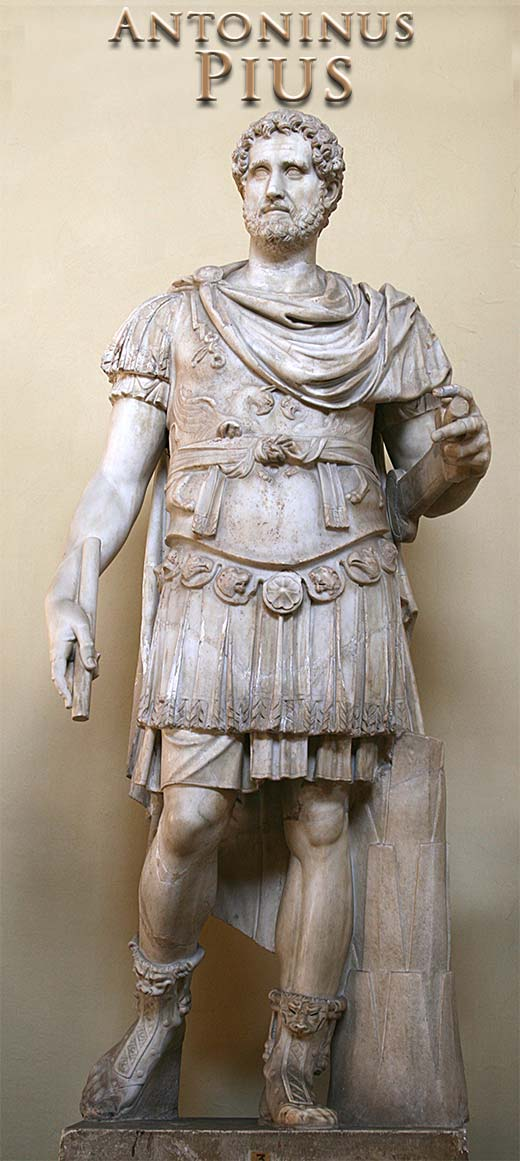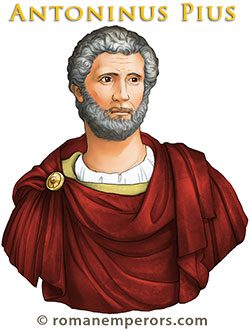Roman Emperor Antoninus Pius
138 - 161 A.D.
Publius Aelius Antoninus Piusus Augustus
Busts, Statues, Coins, Information, Maps, Images, and More

Antoninus Pius: The Philosopher-Emperor Who Ushered in a Golden Age
Antoninus Pius, who reigned as Roman emperor from 138 to 161 AD, stands out as a beacon of peace, stability, and prosperity. He wasn't a flamboyant conqueror or a ruthless leader. Instead, his reign was marked by wisdom, pragmatism, and a dedication to the well-being of the empire. Nicknamed "Pius" (meaning "dutiful") by the Senate, he embodied the virtues of a good emperor, earning the respect and admiration of his people.
From Senatorial Family to Heir Apparent
Born Titus Aurelius Fulvus Boionius Arrius Antoninus in 86 AD to a prominent senatorial family, Antoninus followed the traditional path. He held prestigious positions, demonstrating administrative competence and earning a reputation for fairness and integrity. He caught the eye of the reigning emperor, Hadrian, who, lacking a natural heir, adopted Antoninus in 138 AD. This unexpected turn of fate thrust Antoninus into the position of emperor, a role he initially approached with reluctance.
A Smooth Succession and a Focus on Stability
Hadrian's choice of Antoninus marked a crucial shift. Unlike previous emperors who relied on blood ties, Hadrian prioritized merit and experience. This ensured a smooth transition of power and ushered in a period of stability after decades of turmoil.
Consolidation and Diplomacy Over Conquest
Antoninus, true to his pragmatic nature, chose not to pursue further conquests. He focused on consolidating and strengthening the vast Roman Empire. He addressed infrastructure concerns, improved roads and waterways, and strengthened border defenses. Additionally, he practiced a policy of diplomacy, resolving potential conflicts peacefully.
A Dedication to Public Works and the Flourishing of Cities
Antoninus undertook impressive public works projects, including the construction of aqueducts, temples, and theaters. He invested in the development of provincial cities, fostering a sense of unity and prosperity throughout the empire. This focus on infrastructure further enhanced trade and communication within Roman territories.
A Patron of Philosophy and Education
While not a philosopher-king like his successor, Marcus Aurelius, Antoninus held philosophy in high regard. He supported scholars and philosophers, fostering a vibrant intellectual atmosphere. He also prioritized education, ensuring access to quality learning across the empire.
Benevolent Rule and a Focus on Welfare
Antoninus demonstrated genuine concern for the well-being of his subjects. He enacted social reforms, expanded public assistance programs, and improved the living conditions of the poor. He lowered taxes for certain citizens and reduced the severity of punishments for minor offenses. This focus on social welfare further cemented his image as a benevolent and just ruler.
The Persecution of Christians: A Stain on His Legacy
Although Antoninus is generally regarded as a tolerant leader, his reign was not without blemishes. He authorized sporadic persecutions of Christians, who were seen as a threat to traditional Roman religion. This intolerance remains a dark spot in his otherwise commendable rule.
A Golden Age for Rome and a Peaceful Succession
Antoninus Pius' reign ushered in a period of peace, prosperity, and cultural flourishing often referred to as the Pax Romana (Roman Peace). He fostered stability within the empire and secured its borders. He also played a pivotal role in securing a smooth succession by adopting Marcus Aurelius, a wise choice that ensured the continuation of responsible leadership.
Beyond the Historical Narrative: Antoninus Pius the Man
Historical accounts portray Antoninus as a man of simple tastes, devoted to his family, and respected for his integrity and intelligence. He lacked the military ambitions of some emperors, but his dedication to his people and his focus on good governance earned him the title "Pius," a testament to his character.
Antoninus Pius' legacy is one of wisdom, pragmatism, and a commitment to the well-being of the Roman people. His reign stands as a reminder that leadership isn't just about conquest and glory; it's about fostering stability, prosperity, and a sense of unity within a vast and diverse empire.

More to Come

"The Dutiful"
Antoninus Pius became Emperor in 138 A.D. and, though he was born near Rome in 86 A.D. his family was from Gaul, and he was the first emperor who had roots from Gaul. Antoninus Pius was the son of a Roman consul named Aurelius Fulvus. He was very wealthy and generous, and a solid administrator, and for this reason he was chosen by the Emperor Hadrian to succeed him. Antoninus Pius had a long and peaceful reign as Emperor of Rome. He worked in harmony with the Senate, brought many reforms, and strengthened the borders of the empire. His integrity, gentile spirit, and dedication earned him the nickname "pius" which was given to him by the senate. Information regarding his reign is relatively lacking. In 161 A.D. he became ill and died, he was succeeded by Marcus Aurelius, his adopted son as was the plan of Hadrian.

















Latest




Popular




Useful




